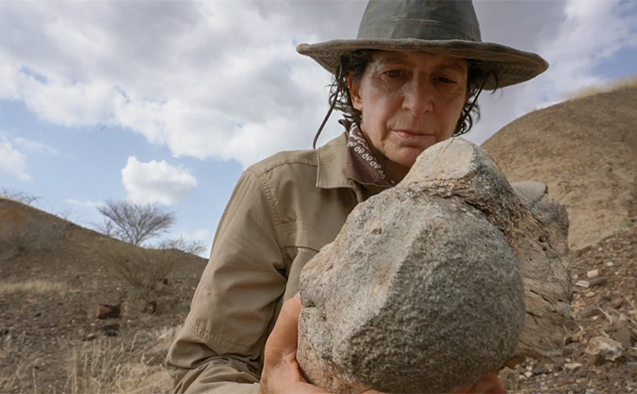WFU anthropologist featured in new PBS/Smithsonian Channel film

In the new film “When Whales Walked: Journeys in Deep Time,” Wake Forest University anthropology professor Ellen Miller stands on a rocky hillside in northern Kenya carefully uncovering 16 million-year-old fossil elephant teeth.
Miller is among several scientists from around the world featured in the two-hour film, created in a first-ever partnership between PBS and Smithsonian Channel. Using innovative storytelling techniques including 3D graphics and CGI, the film traces the evolutionary origins of crocodiles, birds, whales and elephants.
Narrated by actor Lee Pace (“Guardians of the Galaxy,” “The Hobbit,” “Captain Marvel”), the film premieres Wednesday, June 19 at 9 p.m. EDT (check local listings) on both PBS and Smithsonian Channel and will also be available for simultaneous streaming on PBS.org.
Unlocking the Secrets of Elephant Evolution
Referred to as “a sort of Jurassic Park of elephants” in the film, the Turkana Basin field site at Buluk, Kenya, is close to the Ethiopian border and among the hottest, driest places on earth. When Miller discovered prehistoric elephant teeth and jawbones at the site, she contacted friend and colleague William Sanders, an elephant evolution specialist from the University of Michigan, who is also featured in the film. In a space less than half the size of a football field, Miller and her colleagues found fossils from at least five different ancient elephant species.
“Something about how our site was formed has captured more diversity than other places,” Miller said. “Sixteen million years ago, this would have been a woodland with big rivers running through it, and a whole host of different kinds of elephants lived here. One species would have been less than half the size of a modern elephant and would have been snuffling along the riverbank because it liked a wet and closed environment.”
Miller described other species found at the site: “We also have the remains of elephants nicknamed “shovel tuskers” because the ends of their tusks were broad and flat, like shovels, and the wear patterns on the tusks tells us they were using them like scoops. Another big surprise was a new member of the family that later gives rise to mammoths.”
“This kind of evolutionary diversity all in one place is breathtaking.” Ellen Miller, professor of anthropology
As a paleoanthropologist and field researcher, Miller has spent decades studying the fossil evidence for primate and human evolution. Her work includes heading expeditions to the Turkana Basin in search of Miocene fossil animals. Her research contributes to the understanding of the divergence of monkeys and apes and the evolution of modern African mammals. Miller recently worked with an international team of researchers who discovered a 13 million-year-old fossil ape skull that sheds light on ape ancestry (Nature, 2017), and the most primitive known monkey (Proceedings of the National Academy of Sciences, 2019). She was also part of the team that discovered a 19-million-year-old swamp-dwelling creature with large, sensitive lips that she named after Mick Jagger, the front man for the Rolling Stones.
A professor of anthropology at Wake Forest, she is also a member of the Turkana Basin Institute, and her work is supported by the National Science Foundation, National Geographic Society, and the Leakey Foundation.
Miller teaches courses at Wake Forest on human evolution, human biological diversity and biological anthropology.
“When Whales Walked: Journeys in Deep Time” is a major initiative in collaboration with the Smithsonian’s National Museum of Natural History, which opened the David H. Koch Hall of Fossils – Deep Time on June 8. The project features an extensive educational outreach program produced by the National Museum of Natural History and shared with affiliated science museums around the country. Major funding for “When Whales Walked” is provided by The National Science Foundation and The Arthur Vining Davis Foundations. The film was produced by Twin Cities PBS and Shining Red Productions for PBS and Smithsonian Channel.
Photo credit: Courtesy of Twin Cities PBS
Categories: Research & Discovery
Wake Forest News
336.758.5237
media@wfu.edu
Meet the News Team
Headlines
Wake Forest in the News
Wake Forest regularly appears in media outlets around the world.




